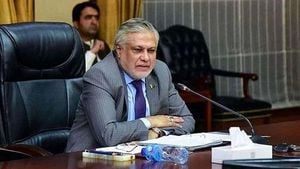In a dramatic escalation of tensions between India and Pakistan, the Indian armed forces launched missile attacks on May 6, 2025, targeting nine sites in Pakistan described as "terrorist bases." This military action, termed "Operation Sindoor" by New Delhi, comes as a direct response to an earlier attack on April 22 in Pahalgam, Indian-administered Kashmir, which resulted in the deaths of 26 people, primarily civilians.
The Indian government characterized the strikes as precise and measured, asserting that they were aimed solely at infrastructure used for planning terrorist activities against India. In a statement, the Indian Ministry of Defence emphasized, "Our actions were targeted, measured, and non-provocative. No Pakistani military installations were targeted." This claim, however, has been met with skepticism from Islamabad.
Pakistan's military quickly condemned the Indian strikes, labeling them an "act of war." Prime Minister Shehbaz Sharif declared that Pakistan has every right to respond with force to what he described as a cowardly attack. Sharif stated, "The entire nation stands with our armed forces on how to deal with the enemy: they will never be allowed to achieve their nefarious objectives." The Pakistani military reported that three civilians, including a child, were killed and several others injured in the attacks.
In retaliation, Pakistan's military claimed to have shot down two Indian fighter jets and conducted artillery strikes across the Line of Control, which demarcates the boundary between Indian and Pakistani-administered territories in Kashmir. The Pakistani army's spokesperson, Lieutenant General Ahmad Sharif, noted that the missile strikes were launched from within Indian territory and asserted that no Indian aircraft had violated Pakistani airspace.
The immediate aftermath of the attacks saw heightened military activity along the Line of Control, with reports of ongoing skirmishes between Indian and Pakistani forces. The situation remains volatile, with both sides accusing each other of violating ceasefire agreements.
The international community has expressed deep concern over the escalating conflict. United Nations Secretary-General Antonio Guterres called for maximum restraint from both nations, warning that the tensions are at their highest in years. Guterres urged both countries to step back from the brink of military confrontation, stating, "It is essential, especially at this critical moment, to avoid a military clash that could easily become uncontrollable."
In the United States, President Donald Trump criticized the Indian military operation, calling it a "disgrace" during a press briefing. Trump’s remarks came as the U.S. State Department confirmed that it is closely monitoring the developments in the region. Secretary of State Marco Rubio has been in contact with officials from both countries, advocating for a collaborative approach to de-escalate tensions.
As the conflict unfolds, the Indian government has taken further steps that could exacerbate the situation. In a move described as a "water war," India announced it would cut off water supplies to rivers originating in its territory that flow into Pakistan. This decision marks a significant shift in the longstanding Indus Water Treaty, which has governed water sharing between the two nations since 1960. Prime Minister Narendra Modi stated, "The water that previously flowed out will now be used to serve India's interests."
The backdrop to this military confrontation is a long history of hostilities between India and Pakistan, particularly over the disputed region of Kashmir. Relations have been particularly strained since a 2019 attack that killed 40 Indian soldiers, prompting India to carry out airstrikes in Pakistan and subsequently revoking the special status of Jammu and Kashmir.
As the situation continues to evolve, both India and Pakistan are under immense pressure from the international community to avoid further escalation. The U.S. and other nations have urged both sides to engage in dialogue to resolve their differences peacefully. However, the deep-seated mistrust and ongoing military actions suggest that a resolution may be far off.
In summary, the missile strikes by India and the subsequent military responses from Pakistan have raised alarms about a potential full-scale conflict between two nuclear-armed neighbors. The world watches closely as both nations navigate this precarious situation, with hopes for a peaceful resolution seemingly dim amidst the rhetoric of war.






